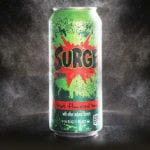 History
History  History
History  Weird Stuff
Weird Stuff 10 Wacky Conspiracy Theories You Will Need to Sit Down For
 Movies and TV
Movies and TV 10 Weird Ways That TV Shows Were Censored
 Our World
Our World 10 Places with Geological Features That Shouldn’t Exist
 Crime
Crime 10 Dark Details of the “Bodies in the Barrels” Murders
 Animals
Animals The Animal Kingdom’s 10 Greatest Dance Moves
 Movies and TV
Movies and TV 10 Box Office Bombs That We Should Have Predicted in 2025
 History
History 10 Extreme Laws That Tried to Engineer Society
 History
History 10 “Modern” Problems with Surprising Historical Analogs
 Health
Health 10 Everyday Activities That Secretly Alter Consciousness
 History
History 10 Dirty Government Secrets Revealed by Declassified Files
 Weird Stuff
Weird Stuff 10 Wacky Conspiracy Theories You Will Need to Sit Down For
 Movies and TV
Movies and TV 10 Weird Ways That TV Shows Were Censored
Who's Behind Listverse?

Jamie Frater
Head Editor
Jamie founded Listverse due to an insatiable desire to share fascinating, obscure, and bizarre facts. He has been a guest speaker on numerous national radio and television stations and is a five time published author.
More About Us Our World
Our World 10 Places with Geological Features That Shouldn’t Exist
 Crime
Crime 10 Dark Details of the “Bodies in the Barrels” Murders
 Animals
Animals The Animal Kingdom’s 10 Greatest Dance Moves
 Movies and TV
Movies and TV 10 Box Office Bombs That We Should Have Predicted in 2025
 History
History 10 Extreme Laws That Tried to Engineer Society
 History
History 10 “Modern” Problems with Surprising Historical Analogs
 Health
Health 10 Everyday Activities That Secretly Alter Consciousness
Top 10 Bizarre Trends of the ’90s
The ’90s are famous for many things—but these days, they’re most famous for their spawn—the overly-nostalgic X-ennial middle-children that call themselves 90s kids. You might be a ’90s kid if you always start sentences with, “Aw man, ‘member…?” You might be a ’90s kid if you think the best version of everything was the version you had when you were 10. You might also be a 90s kid if you caught the Jeff Foxworthy reference and hate it.
The one thing that is guaranteed to be common to all of us 90s kids is that we all grew up with the absolute weirdest trends. Our toys, tech, food, and furniture were all nuts, at least until we collectively wisened up and moved on to the next nonsensical fad. Here are ten of those bizarre trends of the ’90s, and may we all absorb these harsh truths and do better next childhood.
10 Furbies
I need to get these haunting little monsters out of the way first so I can close some tabs and never see their vacant, inhuman eyes again. Furbies were at best an annoying knickknack designed to periodically shout out Simlish and, at worst, an over-the-counter demon for children. It’s been said before: this was an odd fad. Sure, the trend toward home robotics has always been inevitable, but we all expected our home robots to be humanoid butlers or lovable metal dogs, not cheap Mogwai knockoffs that watch you while you sleep.
Somehow, Furbies reigned supreme for a few years, around 1998 and 1999. During this time, 15-20 million Furbies charmed their way into households across the globe and entertained children by nonconsensually recording them and learning their language. However, a series of revivals in the new millennium failed, and at least for now, any Furbie heat is constrained to the back burner.
9 Big Mouth Billy Bass
Let me just say this out loud. It’s a mounted fish. But it’s fake. And it sings. Exclusively the most annoying song you’ve ever heard. And only when someone walks by. Sigh. Okay. As someone who once actually got for Christmas from my mother a towel marked on one side with ‘butt’ and the other side with ‘face,’ let me say with some certainty: joke gifts are not good gifts.
If you know someone who loves fishing, get them a rod and reel or an actual mounted bass. Don’t get them something that forces them to do the awkward, “Why the heck did they get me this? Now I have to fake being thankful, “Gee thanks, grandma!”‘ present performance. This inexplicably successful fish made more than $100 million dollars in its first few months of sale, and later spawned (heh heh) spinoffs such as a Christmas Billy Bass, a deer head named Buck the Animated Trophy, and a new Alexa-enabled Billy Bass, guaranteed to frustrate a number of hippies when they ask their home assistant to “play Phish.”
8 Wassup
Let’s face it: Budweiser was absolutely on fire when it came to advertising in the 90s. I still think about those three delightfully laconic frogs “Bud”, “Weis,” and “Er,” and even their less-popular frenemy the chameleons. Then in 1999, Anheuser-Busch rolled out the “Whassup?” ad, which took their advertising dominance to new levels. The commercial won a Clio, the Oscars of advertising, and was even inducted into the Clio hall of fame. And everyone saw this commercial.
You know they did because everyone started saying whassup constantly, always making it raspier, longer, and more unintelligible. I was a preteen at the time, and this meant that every person in my school said “whassup” every day—in the hallway, in the cafeteria, at recess. Then I would come home and my dad’s friends would be saying it. It was the type of cultural wildfire that forced news anchors to learn the word ‘memetic’—a decade before they learned the word ‘meme.’
7 Blow up furniture
I’m going to place the blame for this one on “Clarissa Explains It All,” “Blossom,” “Saved by the Bell,” and every other 90s kids show in which the characters inevitably slept in overly elaborate rooms filled to the brim with neon, bowling alley carpets, and thrift-store miracle-finds.
There was a lot of wish-fulfillment in 90s kid’s shows when it came to furniture. Those kids had everything, and everything was perfectly unique. It was all so kitschy. To emulate this, normal kids grew up wanting to put their own spin on interior decorating. Enter blow-up furniture. If you’ve ever sat in a blow-up chair in shorts, you know why this trend was doomed to fail, but for a time it was all the rage.
With a few cheap items, kids could make their rooms big, bright, and loud. They could make their room theirs. Of course, anything blow-up in the hands of a child is destined to pop, but that didn’t mean that fun night on the blow-up couch watching Clueless and chatting with Nate on your clear-plastic wall phone wasn’t worth it.
6 Pokemon
Yes, Pokemon is still around and yes, it’s only getting bigger in a lot of ways. But when writing about the bizarre creations of the 90s, you can’t not include its most famous sci-fi anime dogfighting card game/RPG. Love it or kind of love it (because how can you hate Pokemon?) you have to admit that the premise is just insane.
The Pokemon story goes like this: at age 10, Ash, a child whose father is being cuckolded by a Mr. Mime, leaves home alone. He travels the world, sleeping in bushes and blindly trusting every adult he meets in any old dark forest. His goal: find every animal in the world, force it to fight another animal until it loses consciousness, and then capture it inside a Matrix-like digital prison forever. He will periodically let the animals loose for ‘bonding,’ but this is just so they can recover in time for the next fight. After all, the ultimate plan is to catch ’em all, i.e., force the entirety of the natural world into captivity, and that takes capable combatants.
And yes, maybe the franchise has some good qualities, too. Maybe I cried when Ash gave up Butterfree, maybe I still have my first holographic Haunter, and maybe when my little nephew asks me to tell him about all the old Pokemon, my heart explodes. Maybe. But that doesn’t make this franchise any less bizarre as a multi-billion dollar kids’ show and game.
5 AOL Instant Messenger
Sit back and let xX_bannana_hammock_Xx tell you a story. Before the dawn of social media, communication on the internet was more cloistered. Niche communities used small chat services to talk, often about (at the time) counterculture topics like coding, anime, and comics. There were larger instant messaging clients with broader user bases- the old IRC comes to mind- but it wasn’t until 1997, when AOL launched AIM, that an instant messaging service became a widespread phenomenon. AIM launched right when the internet was beginning to become a part of daily life, and unlike other AOL services, was made available for free to any internet user, not just AOL clients. Suddenly the cloister was open to all. And it often got weird.
Suddenly people discovered things like sarcastic away messages, using song quotes on your page to seem deep, ghosting, the perils of creating a ‘close friends’ list, and even forcefully blocking a person from using their own application. That’s right. With AIM, you could “warn” someone enough to forcefully log them off their own account. I don’t think the AIM programmers understood trolling yet.
4 Pogs
Just to be clear, this is where a lot of our addictive personalities were born. Pogs were collectible cardboard discs, ostensibly the caps to old milk jugs, with cool designs drawn on them. As a craze, this one is weird.
They were literally just cardboard circles, although they had skateboarding bigfoots and whatnot on them, which I guess adds value. There was a game based on Pogs, involving slamming stacks of them with heavier plastic or metal discs, though most Pog enthusiasts seemed to be in it just for the collection. And again: the collection was just cardboard circles. This fad understandably didn’t last, and the company which brought the Pog brand to popularity in the early 90s, Canada Games Company, was out of business by 1997. The lasting effect of the craze was that we were now primed at a young age to value hoarding…
3 Beanie Babies
…and hoard we did. For kids, the 90s were all about moving from one collectible craze to another. If looking at the ratio between money spent and lack of reward, Beanie Babies were the king. And they still are, as eBay continues to play host to hundreds of Beanie Baby collectors seeking to cash in and reap their well-earned fortune, only to be disappointed when no buyer appears. For many, Beanie Babies are a hard lesson that just because someone says something has value, that doesn’t mean it actually does. While that can be true—capitalism does exist, after all—Beanie Babies prove it often isn’t.
In 1995, Beanie Babies became a craze. They were cute, cuddly, and adorably named. Their creator Ty, Inc., started “retiring” certain Babies to create market rarity and drive up collection in reaction to this. It worked extremely well for a time. Both Beanie Baby sales and resales were a huge industry. Then came the inevitable collapse, as people starting asking themselves questions like, “What the hell do I do with 500′ Bandage Bears’, and why did I insure every single one for $10,000?”
2 Bowl cuts
Fashion is subjective. What looks good now may look stupid in 10 years, or even now but to a different audience. Except, that is, for bowl cuts. They have never looked good and never will. As their name implies, Bowl cuts are haircuts in which the hair has the shape of an upside-down bowl. Indeed, many of them were created by cutting around actual bowls. This haircut is so wrong, so evil, so universally reviled that even The Ramones couldn’t make them cool.
The Ramones were able to make a song about beating a bratty child with a baseball bat (oh yeah) and make that cool, but they couldn’t make bowl cuts cool. I know fashion is supposed to cyclical. I’d rather spin back around to wearing the skulls of enemy tribes as a belt before I accept bowl cuts back.
1 Nicktoons
Before you lash the timbers together for the crucifixion, just hear me out. The article title is “bizarre” 90s trends—not bad trends, not good trends, just bizarre ones. And Nickelodeon in the 90s was so strange, the long-forgotten Greek god of bizarreness Catdogius was able to regain his full former power and take Zeus’s throne. Here’s a test. Google search “most normal Nicktoon” and count the results.
Now Search “Nicktoon” alongside “weird,” “strange,” or even “creepy” and count those results. As fun as it was describing the Pokemon plot without context, attempting that with Spongebob would be suicide. “Rocko’s Modern Life,” for one, is so weird that even just the intro sequence plays like one of David Lynch’s transcendental meditation dreams if the director had been experimenting with mescaline and bath salts. Even “Rugrats,” which in theory is just a show about babies, uh… doing baby stuff, feels like a fever dream at times. Don’t believe me? Go watch “Angelica’s Worst Nightmare,” and then we’ll talk.








